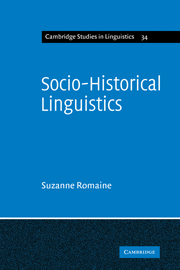Book contents
- Frontmatter
- Contents
- Dedication
- Preface
- Dedication
- 1 Methodology and aims
- 2 Methods for a sociolinguistic study of historical syntax
- 3 The history of the relative clause/markers in English with special reference to Middle Scots
- 4 The linguistic variables
- 5 The extralinguistic variables: methods for the reconstruction of language in its social context
- 6 Analysis of the data by two sociolinguistic techniques: cross-product analysis and implicational scaling
- 7 Variable rule analysis of the data
- 8 The bearing of sociolinguistic data on linguistic hypotheses
- 9 On the epistemological status of sociolinguistic theory
- Bibliography
- Index
5 - The extralinguistic variables: methods for the reconstruction of language in its social context
Published online by Cambridge University Press: 05 May 2010
- Frontmatter
- Contents
- Dedication
- Preface
- Dedication
- 1 Methodology and aims
- 2 Methods for a sociolinguistic study of historical syntax
- 3 The history of the relative clause/markers in English with special reference to Middle Scots
- 4 The linguistic variables
- 5 The extralinguistic variables: methods for the reconstruction of language in its social context
- 6 Analysis of the data by two sociolinguistic techniques: cross-product analysis and implicational scaling
- 7 Variable rule analysis of the data
- 8 The bearing of sociolinguistic data on linguistic hypotheses
- 9 On the epistemological status of sociolinguistic theory
- Bibliography
- Index
Summary
[Historical] records do not, by themselves, produce a unique solution to our problems. But who has ever assumed that they do? Historical records do not produce a unique solution for historical problems either, and yet nobody suggests that they be neglected … The question is how they should be used.
Paul Feyerabend (1978: 253)In this chapter I discuss the extralinguistic factors which may affect the choice of relative markers, and a method for taking such factors into account in my study. I take it that it is also within the scope of this discussion to provide a critical review of some current methodological principles which relate to my investigation of the relative markers in Middle Scots, for example, sampling procedures and the problem of defining style and isolating contextual styles within texts. I will be particularly concerned with examining the extent to which the nature of my data allows the transfer or necessitates modification of sociolinguistic methods which have been used in dealing with synchronic speech data (cf. also Chapter 2). Although I am treating specifically one particular set of Middle Scots data, the problem I face is a more general one, which might be called the ‘reconstruction of language in its social context’. The question of whether such reconstruction is in principle possible is fundamental to the larger issue my work raises, namely, the status of socio-historical linguistic theory.
The problem of sampling
There are a number of ways in which a sample of data suitable for sociolinguistic analysis might be obtained. Currently the most fashionable one consists of interviewing individuals and groups both formally and informally.
- Type
- Chapter
- Information
- Socio-Historical LinguisticsIts Status and Methodology, pp. 105 - 138Publisher: Cambridge University PressPrint publication year: 1982



